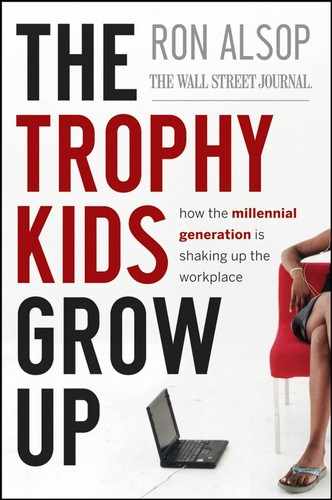9.3. MOVIES AND GAMES
To score points with millennials, some recruiters are playing to the generation's video and gaming culture. KPMG challenged its interns to create videos about integrity and picked a spoof of the television series The Office as winner. Similarly, Boston Consulting Group Inc., a management consulting firm, invited students to create two-minute videos about what strategy is and why it's important. "We allowed millennials to show their stuff," says Kermit King, senior partner and head of recruiting for the Americas. "We were looking for originality and saliency. In classic millennial fashion, the videos were all about them."
Boston Consulting's winning video: "The Coffee Interns." Two interns race to be first to fetch coffee for one of the firm's consultants, seeing "a window of opportunity for a promotion." Their strategies range from "asset management—utilizing physical resources" by driving to a coffee shop to "networking—engaging human capital" by phoning in the coffee order so that it's ready and waiting. Ultimately, both lose to a third intern who applied the "fixing the root of the problem—thinking beyond the cup" strategy and quickly brewed a pot of coffee at the office.
Some recruiters include video games on career pages and social networking sites, along with computer screen savers and wallpaper. GoArmy.com, for example, is highly interactive in trying to bring the military experience alive on young people's computers. The site offers camouflage design and other wallpaper patterns and such video games as Army Target Practice, Basic Rifle Marksmanship, Patriot Missile System Simulation, and Blackhawk Challenge. The Army Active Desktop lets users switch to night vision, add patches and medals, and rotate and flip vehicles. Potential recruits also can listen to such tunes as "The Army Goes Rolling Along" and soldiers' marching music.
Other recruiters, such as L'Oréal, Procter & Gamble Co., and Groupe Danone, encourage students to play strategy games that promote the company and help the employers spot promising talent. Some contests are open to undergraduate and graduate students; others are limited to M.B.A.s. Through the business simulation games, companies can see students in action, demonstrating creativity, tactical thinking, teamwork, and persuasion skills.
The games, which are typically played at least partly online, change from year to year. Procter & Gamble's Just in Case competition, for instance, has focused on its Olay and Swiffer brands and challenged players to identify the next company P&G should acquire. With more emphasis on corporate responsibility today, the French food and beverage company Groupe Danone created an international management game called Trust. It requires students to formulate a profitable three-year business strategy for a Groupe Danone subsidiary, while taking into consideration social, environmental, and ethical issues and retaining "the trust of all the company's stakeholders."
"Students see these games as more fun and engaging than the usual company information sessions and receptions," says Steve Pollock, cofounder of WetFeet Inc., a recruiting consulting firm. In addition, the games enable companies to reach out to many more campuses than recruiters could ever visit. For example, L'Oréal's e-Strat Challenge marketing game attracted about 44,000 students from 128 countries in 2007.
L'Oréal particularly hoped the game would change its image with male students. It was perceived as a little old-fashioned and as a company more for women, but now it believes that e-Strat has helped it demonstrate that L'Oréal is a modern, world-class employer. In e-Strat, student teams run a virtual cosmetics company called Prima, whose cyber-competitors include Diva, Bella, Vista, and Mirror.com. They must make dozens of decisions as they manage new brands, Web sites, distribution channels, advertising budgets, and research and development. Should they sell in discount or department stores? Is their target market families or singles, the affluent or low income? Aware of the millennial generation's interest in corporate citizenship, L'Oréal has added diversity and social and environmental responsibility issues to the game.
Each team's online performance is measured with an index that reflects market share, profitability, research and development quality, and customer satisfaction. In the end, finalists travel to L'Oréal's Paris headquarters to defend their business plans before a panel of judges. In addition to a possible job offer, winners receive a trip to the destination of their choice.
L'Oréal clearly has become the grand master of strategy games. In addition to e-Strat for both M.B.A. and undergraduate students, there's Brandstorm, in which undergraduates act as marketing managers for such brands as Lancôme and Garnier, and Ingenius, in which engineering and supply chain students take on an industrial project. "The games give us a direct link to the Internet generation," says François deWazières, L'Oréal's director of international recruitment. "They're a smart way to show what it's like inside L'Oréal and to let students see the company's global scope and opportunities for a fast-paced career."
